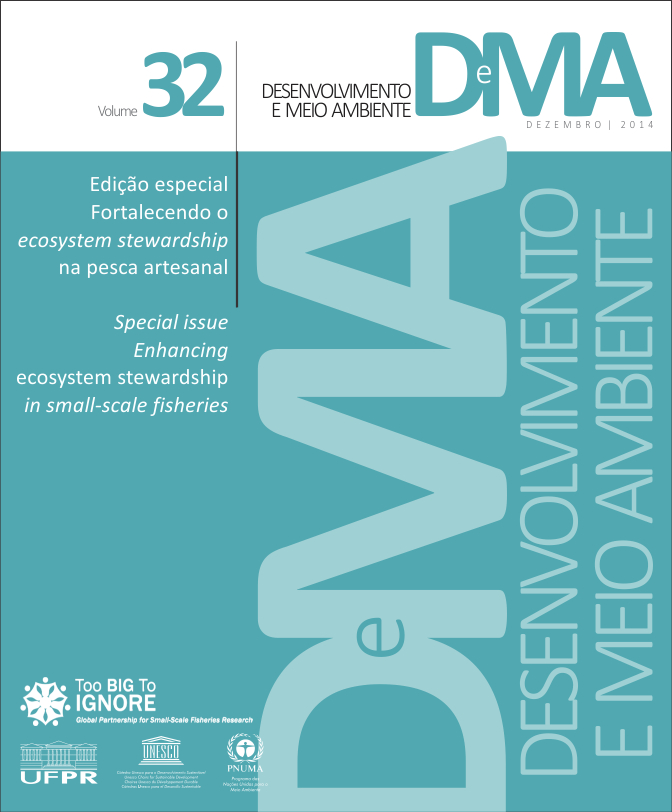Participatory Monitoring Experience On-Board Artisanal Fishing Vessels in Território da Cidadania do Baixo Sul da Bahia, Northeastern Brazil
DOI:
https://doi.org/10.5380/dma.v32i0.35742Keywords:
participatory action research, on-board observers, biological sampling, spawning aggregations, reef fisheriesAbstract
A pilot experience of participatory monitoring and biological sampling realized by artisanal fishermen on-board their vessels was conducted between January 2011 and April 2012 in a Territory of Citizenship of Southern Bahia. The approach adopted aimed at including fishermen in the research process, valuing traditional knowledge and also ensuring the acquisition of biological data of difficult access on the spawning of reef fish caught in reproductive aggregation sites distant from the coast. The action was developed through the integration of collaborating fishermen within the research. Two masters of the artisanal handline fishing, recognized as experts in the communities of Valença and Camamu, have benefited from research grants by the state foundation for research supporting – FAPESB. The collaborating masters and crews of vessels were qualified and involved in the monitoring process, collecting information on-board about catches, fishing effort, exploited areas (fishing spots), biometrics and stages of sexual maturation. Monthly orientation and monitoring supervision of collaborating fishermen were conducted by researchers and technicians from the State University of Feira de Santana (UEFS) and the agricultural development agency of Bahia state (EBDA). A total of 56 handline fishing operations from 24 fishing spots were monitored; 26 taxa were recorded during these fisheries, 3,271 fishes were measured and weighed, and 149 gonads were collected. The evaluation of the approach was based on qualitative parameters: 1) engagement and collaboration in the activity, 2) efficiency and consistency in data collection, filling out the forms and classification of gonads. The main challenge of the proposed approach is the perception of the fishermen about the relevance of participatory monitoring to promote the construction of knowledge about the fishery and the reproductive dynamics of fisheries resources. A continuous action is considered essential to the strengthening of trust relationships established between fishermen, technicians and researchers, as well as to develop actions that promote the conservation and sustainable use of natural resources.
Downloads
Published
How to Cite
Issue
Section
License
Copyright on works published in this journal rests with the author, with first publication rights for the journal. The content of published works is the sole responsibility of the authors. DMA is an open access journal and has adopted the Creative Commons Attribution 4.0 Not Adapted (CC-BY) license since January 2023. Therefore, when published by this journal, articles are free to share (copy and redistribute the material in any medium or format for any purpose, even commercial) and adapt (remix, transform, and create from the material for any purpose, even commercial). You must give appropriate credit, provide a link to the license and indicate if changes have been made.
The contents published by DMA from v. 53, 2020 to v. 60, 2022 are protected by the Creative Commons Attribution-NonCommercial-NoDerivatives 4.0 International license.
DMA has been an open access journal since its creation, however, from v.1 of 2000 to v. 52 of 2019, the journal did not adopt a Creative Commons license and therefore the type of license is not indicated on the first page of the articles.




